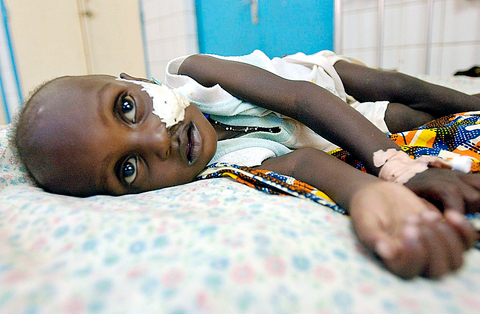Tens of millions of Africans will continue to go hungry over the next 20 years unless major changes in trade and aid policies are enacted, a research institute said yesterday.
More than 38.3 million children will suffer from malnutrition in 2025 if trends continue, and current policies will do little to improve long-term prospects, the International Food Policy Research Institute predicted in a report.
With millions already suffering from severe food shortages in the semi-arid lands along the Sahara, known as Africa's Sahel region, the report said the entire continent needed at least US$303.2 billion in new investments to reduce hunger.

PHOTO: EPA
"Many of the challenges facing Africa's agricultural sector stem from a few root causes, including poor political and economic governance in many African countries, inadequate funding for the agricultural sector, poor water resources management, and neglect of research and development," the report said.
The Washington-based institute's researchers used computer modeling to analyze the effect of different trade, aid and agricultural policies to prepare a forecast for the next 20 years, depending on steps taken at the national and international level.
If there are no significant changes in the current policies, there will only be a small reduction in the percentage of malnourished children in sub-Saharan Africa from 32.8 percent to 28.2 percent. But when population growth is considered, the total number of hungry children will actually rise from 32.7 million to 38.3 million.
"A contributing factor to ongoing food insecurity under this scenario is the expected modest growth in agricultural production by historical standards to 2025," the report said.
Adopting a pessimistic scenario, which factors in the effects of HIV/AIDS and the declining foreign investment in African countries, the institute predicted that the number of malnourished children in sub-Saharan Africa would rise to 55.1 million.

TIT-FOR-TAT: The arrest of Filipinos that Manila said were in China as part of a scholarship program follows the Philippines’ detention of at least a dozen Chinese The Philippines yesterday expressed alarm over the arrest of three Filipinos in China on suspicion of espionage, saying they were ordinary citizens and the arrests could be retaliation for Manila’s crackdown against alleged Chinese spies. Chinese authorities arrested the Filipinos and accused them of working for the Philippine National Security Council to gather classified information on its military, the state-run China Daily reported earlier this week, citing state security officials. It said the three had confessed to the crime. The National Security Council disputed Beijing’s accusations, saying the three were former recipients of a government scholarship program created under an agreement between the

Sitting around a wrestling ring, churchgoers roared as local hero Billy O’Keeffe body-slammed a fighter named Disciple. Beneath stained-glass windows, they whooped and cheered as burly, tattooed wresters tumbled into the aisle during a six-man tag-team battle. This is Wrestling Church, which brings blood, sweat and tears — mostly sweat — to St Peter’s Anglican church in the northern England town of Shipley. It is the creation of Gareth Thompson, a charismatic 37-year-old who said he was saved by pro wrestling and Jesus — and wants others to have the same experience. The outsized characters and scripted morality battles of pro wrestling fit

ACCESS DISPUTE: The blast struck a house, and set cars and tractors alight, with the fires wrecking several other structures and cutting electricity An explosion killed at least five people, including a pregnant woman and a one-year-old, during a standoff between rival groups of gold miners early on Thursday in northwestern Bolivia, police said, a rare instance of a territorial dispute between the nation’s mining cooperatives turning fatal. The blast thundered through the Yani mining camp as two rival mining groups disputed access to the gold mine near the mountain town of Sorata, about 150km northwest of the country’s administrative capital of La Paz, said Colonel Gunther Agudo, a local police officer. Several gold deposits straddle the remote area. Agudo had initially reported six people killed,

SUSPICION: Junta leader Min Aung Hlaing returned to protests after attending a summit at which he promised to hold ‘free and fair’ elections, which critics derided as a sham The death toll from a major earthquake in Myanmar has risen to more than 3,300, state media said yesterday, as the UN aid chief made a renewed call for the world to help the disaster-struck nation. The quake on Friday last week flattened buildings and destroyed infrastructure across the country, resulting in 3,354 deaths and 4,508 people injured, with 220 others missing, new figures published by state media showed. More than one week after the disaster, many people in the country are still without shelter, either forced to sleep outdoors because their homes were destroyed or wary of further collapses. A UN estimate